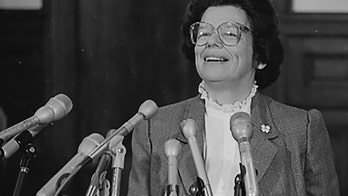WASHINGTON – The House on Wednesday overwhelmingly approved a bill to allow houses of worship damaged by Superstorm Sandy to receive federal disaster aid from the Federal Emergency Management Agency.
The House voted 354-72 for the bill, which now goes to the Senate. Houses of worship would be added to the federal government's list of private nonprofit organizations eligible for FEMA aid to help rebuild under the measure. Critics said it goes against the constitutional separation of church and state.
Backers of the bill say hundreds of houses of worship were damaged in the storm and that many of them continued to serve their stricken communities providing help such as shelter and food.
Sandy roared up the East Coast and pounded several states in late October, especially New York and New Jersey. It was the deadliest hurricane in the northeastern U.S. in 40 years and the second-costliest in the nation's history, a recent National Hurricane Center report said.
The measure, co-authored by Rep. Chris Smith, R-N.J. and Rep. Grace Meng, D-N.Y., allows houses of worship to seek grants from FEMA's disaster relief fund, which helps pay for rebuilding efforts, restoring power and other immediate needs arising from the storm.
"These houses of worship are conduits of healing and rebuilding in the community, while lacking the resources to address their own structural damage," said Smith.
Rep. Peter King, R-N.Y., said churches, synagogues, mosques, temples and other religious institutions deserve the same treatment as other non-profit organizations.
"They shouldn't be penalized just because of their religious involvement," said King.
Fellow New York Rep. Jerrold Nadler, a Democrat, said there were "real constitutional problems" with using taxpayer dollars to rebuild structures such as religious sanctuaries and altars that are not used by the general public. He complained the bill was rushed to a vote a few days after it was filed, without any hearings or consideration by the Judiciary Committee.
Americans United for Separation of Church and State opposed the bill, saying taxpayers should not be asked to pay for reconstruction of houses of worship. The group said public funding of religion violates the Constitution and that a long line of federal court decisions bars government support for buildings used primarily for worship.
"A fundamental rule of American life is that congregants, not the taxpayers, pay for the construction and repair of houses of worship. We must not let a storm sweep away the wall of separation between church and state," Rev. Barry W. Lynn, Americans United executive director, said in a statement.
The American Civil Liberties Union also opposed the bill.
"Religious liberty starts from the precept that religion thrives when both religion and government are safeguarded from the undue influences of the other," said Dena Sher, legislative counsel for the ACLU.
Sher said FEMA has a longstanding policy of limiting grants only to nonprofits with facilities used to provide emergency, essential, and government-like activities. Houses of worship, just like the many other nonprofit facilities, are ineligible to receive these grants, she added.
There was more than $11 billion ticketed for FEMA's disaster relief fund in the overall $50.5 billion Sandy aid package that Congress approved last month and was signed into law by President Obama.
Supporters of the bill said there is precedent for houses of worship receiving federal aid. After the Oklahoma City bombing in 1995, Congress overruled FEMA's refusal to provide aid to damaged churches, they said, and after an earthquake in Seattle in 2002, the Justice Department stepped in and directed FEMA to assist religious organizations damaged by the quake.
The bill was backed by several religious organizations, including the American Jewish Committee, the U.S. Catholic Conference of Bishops, the National Association of Evangelicals and the Jewish Federations of North America.




